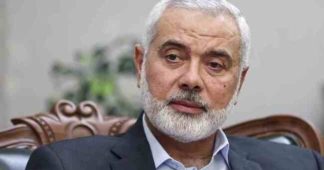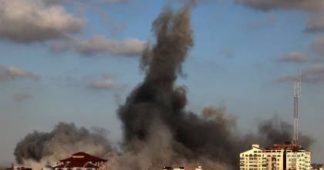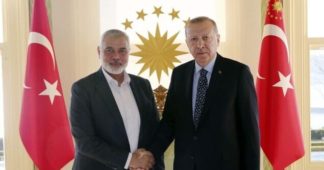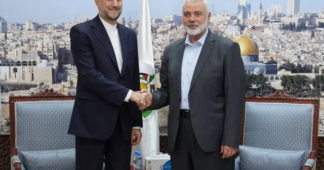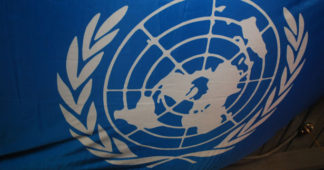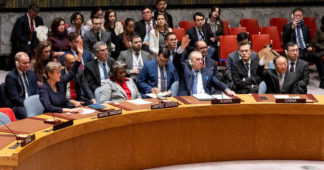Turkish FM announces Hamas’s willingness to disband its military wing in exchange for a two-state solution, following discussions with Hamas leader Haniyeh.
Apr. 18, 2024
Hamas is willing to disband its military wing once a Palestinian state is established with 1967 borders, Turkish Foreign Minister Hakan Fidan said on Tuesday after meeting with the Palestinian group’s political bureau leader Ismail Haniyeh in Qatar.
Fidan and Haniyeh met for three hours and discussed humanitarian aid to Gaza, ceasefire talks, and the future of hostages, according to Turkish reports.
Fidan disclosed that some Western states had positively viewed the intensified efforts towards a permanent ceasefire in Gaza based on a two-state solution but expressed concerns about Hamas.
He stated that he had exchanged viewpoints with Hamas leaders on how to clearly articulate their perspectives and aspirations, especially regarding the two-state solution.
“In our political talks with Hamas for years, they have accepted a Palestinian state to be established within the 1967 borders,” Fidan told reporters at a news conference alongside his Qatari counterpart Sheikh Mohammed bin Abdulrahman Al-Thani.
“They have told me that following the establishment of the Palestinian state, Hamas would no longer need an armed wing and they would continue as a political party,” he added.
He addressed what he described as “Israeli propaganda” against the Palestinian group in an attempt to portray it as a “terrorist organisation” like the Islamic State group [IS], rather than a national resistance movement.
“Unfortunately, Israeli propaganda about Hamas, which tries to describe [it] as a terrorist organisation… rather than as a national resistance movement, finds favour in the West and some actors in international public opinion,” Fidan said.
Fidan said he had expressed condolences to Haniyeh after the targeted killing of his three sons and five grandchildren in an Israeli airstrike in Gaza, adding that he also had conveyed greetings from Turkish President Recep Tayyip Erdogan.
The Turkish president will meet Haniyeh in Istanbul on 20 April, according to reports.
Fidan’s comments come ahead of a scheduled vote at the United Nations Security Council (UNSC) on a Palestinian request for full UN membership – a move that Israel’s ally, the United States, is expected to block because it would effectively recognise a Palestinian state.
The 15-member council is due to vote at 1900 GMT on Friday on a draft resolution that recommends to the 193-member UN General Assembly that “the State of Palestine be admitted to membership in the United Nations”.
A council resolution needs at least nine votes in favour and no vetoes by the US, Britain, France, Russia or China to pass. Diplomats say the measure could have the support of up to 13 council members, which would force the US to use its veto.
Council member Algeria, which put forward the draft resolution, had requested a vote for Thursday afternoon to coincide with a Security Council meeting on the Middle East, which is due to be attended by several ministers. However, the vote was pushed to Friday.
A two-state solution- what does this entail?
The UN Security Council has long endorsed a vision of two states living side by side within secure and recognised borders. Palestinians seek a state in the occupied West Bank, East Jerusalem and the Gaza Strip, all territories captured by Israel in 1967.
Little progress has been made in achieving Palestinian statehood since the signing of the Oslo Accords between Israel and the Palestinian Authority in the early 1990s.
The Palestinian push for full UN membership comes six months into Israel’s deadly war in Gaza, where Israeli officials have voiced intentions to expand illegal settlements, and as Israel continues to expand settlements in the occupied West Bank – a move deemed illegal under international law.
The United States and other Western nations have consistently highlighted their opposition to Israeli settlement building in the occupied Palestinian territories, deeming the move illegal and urging Israel to stop.
We remind our readers that publication of articles on our site does not mean that we agree with what is written. Our policy is to publish anything which we consider of interest, so as to assist our readers in forming their opinions. Sometimes we even publish articles with which we totally disagree, since we believe it is important for our readers to be informed on as wide a spectrum of views as possible.
